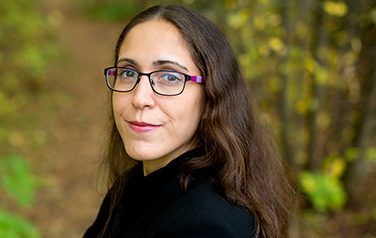Exploring and shaping the scientific conversation
Open science and science policy are two of Lynn Kamerlin’s favorite topics. Alongside her own research she is dedicated to advance not only science itself but also the way science is conducted.
Research is a constant evaluation and reevaluation of models. Lynn Kamerlin is operating in one of the fields currently going through major changes, which she finds to be challenging in the most positive sense of the word.
− This is an exciting time. Enzymology is an interesting and fairly old field, but now a new view has emerged on how proteins evolve. We thought we knew it all, and then we realized that we didn’t and because of that we are now getting closer to truly knowing, said Lynn Kamerlin.
Lynn Kamerlin’s research resides in the interface between chemistry and biology, spanning a range of topics from computational biology to mechanistic organic chemistry. Her research group uses computational techniques to understand the chemistry underlying complex biological problems, such as protein evolution and enzyme selectivity.
− Protein evolution is fundamental for life. The core of what we do in my research group is “blue skies research”, but there are many industrial applications for enzymes, so what we find out now can have effects on many things in society later on.
Parallel with her research Lynn Kamerlin is highly active in science policy, which occupies a lot of her time both at work and on her spare time. She is currently Chair of the Young Academy of Europe, an association of young researchers in Europe, aiming to shape science and science policy with the perspective of a young generation.
− I am very interested in seeing what will happen to the EU Research and Innovation programme Horizon 2020 budget because in a time of financial crisis, which we are in now, research is usually one of the first things to go.
Another hot topic is open science where a big transition currently is going on towards open sharing of data. Lynn Kamerlin has recently represented the Young Academy of Europe at relevant workshops and validation discussions.
− We are in the process of preparing a position statement on this issue that should be ready soon. I am also in discussion with representatives from several organizations working with this question as we prepare our position statement.
Lynn Kamerlin is also coordinator of the Faculty of Science and Technology mentor program for women at Uppsala University and hosting a big symposium on women in science in May 2015. The symposium will be a mix of science policy issues, sociological aspects such as history of women in academia, as well as personal experiences.
− Promoting women in science is in everyone’s interest. I have been met with much support in this effort, which is really great. The line up for the symposium is spectacular; we have some of Europe’s leading researchers on the speaker list, among others Marja Makarow, vice president for research at the Academy of Finland, and Vera T. Sós, top mathematician at the Hungarian Academy of Sciences, to name just two examples.
Lynn Kamerlin first became involved in SciLifeLab via colleagues and became faculty member in early autumn 2014.
− I think SciLifeLab is a really exciting initiative and opportunity to make a difference for life sciences at both the Swedish and the European level. This is something I want to be part of and contribute to.
Short facts:
Name: Lynn Kamerlin
Profession: Senior lecturer at the Department of Cell and Molecular Biology, Uppsala University.
Connection to SciLifeLab: SciLifeLab faculty member.
Leisure activities/hobbies: Photography, dance (especially tango) and playing the piano.
What you didn’t know about Lynn Kamerlin: She has played the piano publicly at the Beethoven’s memorial at the home of Beethoven’s long-time friend Countess Anna Maria Erdödy in Vienna.
November 2014
Sara Engström





